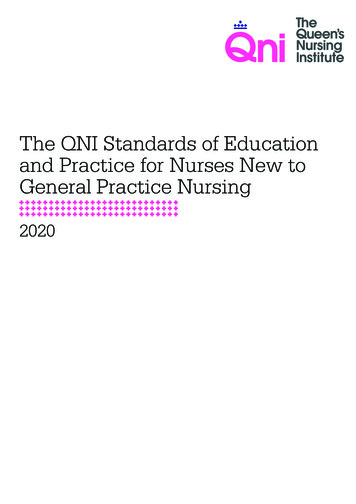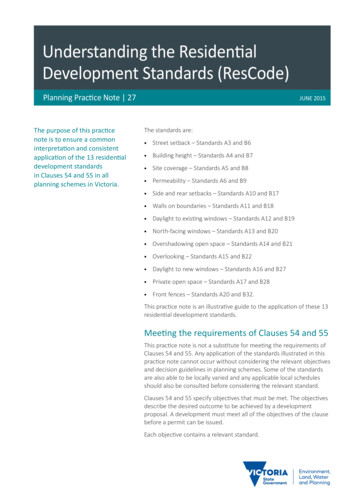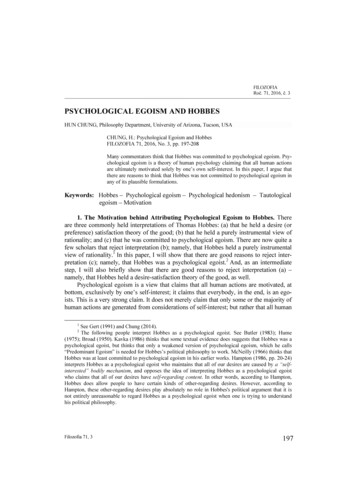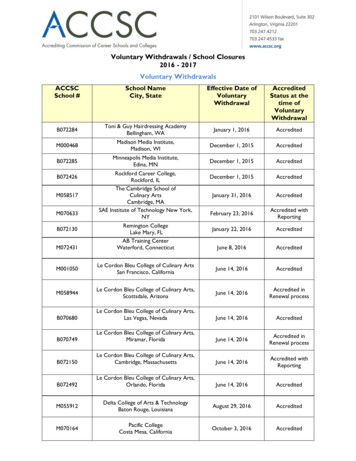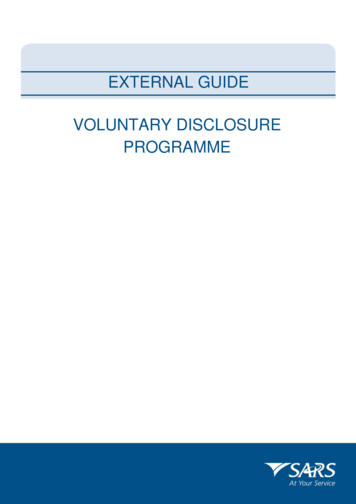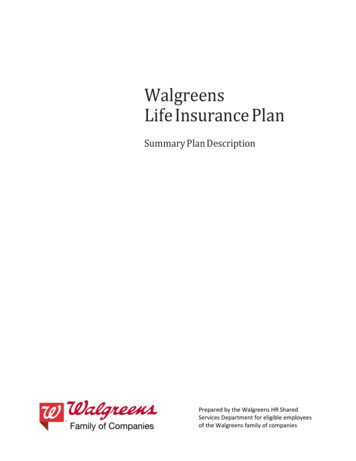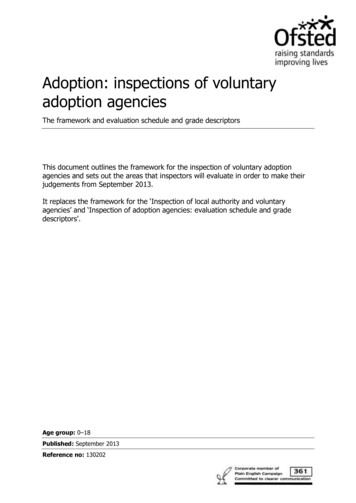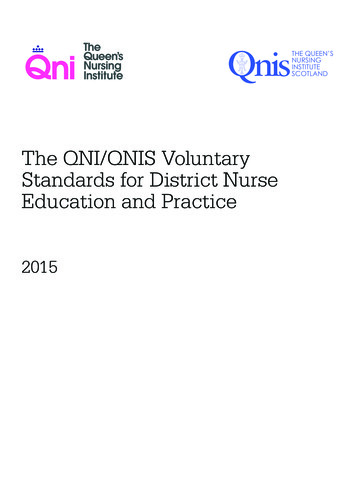
Transcription
THE QUEEN’SNURSINGINSTITUTESCOTLANDThe QNI/QNIS VoluntaryStandards for District NurseEducation and Practice2015
Purpose of the workThe Queen’s Nursing Institute (QNI) and The Queen’s Nursing Institute Scotland (QNIS) worked togetherwith leading experts from across the UK to develop a set of voluntary standards to support District Nurseeducation and practice. The standards make explicit the practice expectations of District Nurses on completinga Specialist Practice Qualification (SPQ) programme and offer a basis for education programmes preparingthe District Nurse for a new era.Never has the specialist expertise of the district nursing service been more central to the provision of healthand care in the UK. There is a clear policy shift to community based, integrated health and social care in allfour countries of the UK with an enhanced focus on admission avoidance, behaviour change and self-care1,2,3,4,5.The first phase of the work established a UK wide consensual view of the role of a District Nurse with aSpecialist Practitioner Qualification (SPQ). Standards were then designed to reflect this in terms of boththe contemporary and future role of the District Nurse leading the service. More detail about the projectmethodology can be found in Appendix 1.Currently, all District Nurse courses, which lead to a recordable SPQ, must meet the Nursing and MidwiferyCouncil (NMC) 2001 standards for specialist education and practice6. The QNI/QNIS voluntary standards aredesigned to build on and enhance the NMC standards, but not to replace them. Representatives from theNMC have been closely involved to indicate how the new QNI/QNIS voluntary standards may best enhancethe regulatory standards.The QNI and QNIS recommend that the new QNI/QNIS voluntary standards for District Nurse Educationand Practice are adopted by all education providers currently offering the NMC approved Specialist PracticeDistrict Nurse programme in the UK.District NursesThe District Nurse role is highly complex and requires skills in negotiating, coaching, teaching and supportingpeople and their carers, whilst effectively collaborating with other agencies and services involved in enablingpeople to remain safely in the community.District Nurses are experts who specialise in: adapting and providing a wide range of nursing care in home and community based settings; assessing and managing unpredictable situations flexibly and responsively; coordinating care, whether anticipated or unscheduled, with individuals and their families, throughacute illness, long term and multiple health challenges and at the end of life; working collaboratively and creatively with colleagues in General Practice, social care, communitypharmacy, nursing specialisms, allied health professions and others to improve the health and care ofindividuals, families and communities, particularly the most vulnerable; ongoing management of people with multiple pathology and long term conditions whose mobility isimpaired; and leading and managing a team to deliver care in the home and community.Using the QNI/QNIS voluntary standardsThe QNI/QNIS voluntary standards are designed as a starting point to support discussion and planning aslocalities, regions and countries look to further develop community nursing roles in a variety of service1. NHS England (2014) Five Year Forward View 10/5yfv-web.pdf2. NHS Education for Scotland (NES) Career and Development framework for District Nursing: rsing career framework fsec.pdf3. NHS Scotland (2013) Routemap to the 2020 Vision for Health and Social Care: http://www.gov.scot/Resource/0042/00423188.pdf4. Welsh Assembly government (2010) Setting the direction: Primary and Community Services Strategic Delivery Programme:5. Dept of Health, Social Services and Public Safety (Northern Ireland) (2010) Transforming your care. A review of health and social care in NorthernIreland.6. UKCC (2001) Standards for Specialist Education and Practice.1
models and within integrated health and social care teams. They are not intended to capture the depth andbreadth of the expert and compassionate care which District Nurses and their teams deliver 24 hours a day,7 days a week across the UK, from the inner cities to the remote islands.The term “voluntary standards” was agreed in order to differentiate the QNI/QNIS standards from regulatoryor mandatory standards, such as those set by the NMC. However it is anticipated that the QNI/QNISstandards are voluntarily adopted as best practice by Higher Education Institutions (HEIs) offering theDistrict Nurse programme. Ensuring that programmes meet the voluntary standards will enable the HEIsto demonstrate that their programmes are preparing practitioners who are equipped to lead and managecurrent and future district nursing services. The relationship of the QNI/QNIS voluntary standards to theNMC standards is illustrated in diagram 1, in Appendix 1 and the new voluntary standards are mappedagainst the NMC standards in Appendix 3.It will not be mandatory for HEIs to map their District Nurse programmes against the new voluntary standards,but it would be considered as best practice and education commissioners may specify this in their educationcontract.The QNI/QNIS will not monitor the voluntary standards as the burden of regulation and quality assuranceon HEIs is already high and the review of the voluntary standards would be addressed through the qualityassurance processes already in place. At programme approval/reapproval, the NMC has indicated that theirreviewer would note within the quality assurance report if the QNI/QNIS voluntary standards had beenadopted.The QNI/QNIS voluntary standards aim to: Provide patients and the public a contemporary description of the role of the District Nurse; Identify the key aspects of the District Nurse’s role, grouping them under the four key domains thatreflect the breadth of competence required for safe, effective, high quality person-centred care; Support current education programmes in focussing on agreed best practice whilst mapping againstNMC standards; Guide the development of future District Nurse specialist practice education programmes; Enable District Nurses to articulate their role within an integrated health and social care team; Provide a framework for service commissioners and providers in planning District Nursing services.The voluntary standards reflect the specialism of the District Nurse in adapting care to each individualhousehold, assessing and managing unpredictable situations, environments and risks. The breadth of carerequired includes palliative and end of life care, on-going support for and management of people with multiple7pathology and long term conditions whose mobility is impaired, early recognition and management of frailty,tissue viability and wound management, management of people with invasive therapies, some needingacute home care and supporting families and carers and individuals who have dementia and other irreversibleconditions which require the provision of long term care.7. Patients who are mobile will normally attend the General Practice Nurse.2
DomainsDomain One - Clinical CareDomain Two - Leadership and Operational ManagementDomain Three - Facilitation of LearningDomain Four - Evidence, Research and DevelopmentDomainDomain One:Clinical CarePractice Standards1.1 Demonstrate a broad range of specialist district nursing clinical expertise that supportshigh quality person-centred care for the caseload population in a variety of communitysettings.1.2 Use appropriate physical and clinical examination skills to undertake the assessmentof individuals with complex health care needs or those presenting with more acuteillnesses, using a range of evidence based assessment tools and consultation models toenable accurate diagnostic decision making and recognition of other potential differentialdiagnoses.1.3 Assess the health related needs of families and other informal carers, developingtherapeutic relationships and using creative problem solving that enables shared decisionmaking for the development of care plans, anticipatory care and delivery of care packages.1.4 Supervise the delivery of person centred care plans by the district nursing teamensuring regular evaluation of care and develop systems to support staff interventions andcare quality.1.4.1 Support all staff to use tools to identify changes in health status and maximise theskills of the District Nurse to support complex assessment where the patient is showingsigns of deteriorating health or new symptoms.1.5 Assess when additional expertise is necessary and make objective and appropriatereferrals, whilst maintaining overall responsibility for management and co-ordination ofcare.1.5.1 Ensure clear lines of accountability with respect to delegation, supervision andmechanisms for the assurance of clinical and care governance including antimicrobialstewardship.1.6 Source and utilise eHealth technology and technology assisted learning systems tosupport self-care and improve efficiency and effectiveness of the district nursing service.1.6.1 Work collaboratively with others to identify individuals who would benefit fromtechnology, with ongoing support and management.1.7 Promote the mental health and well-being of people and carers in conjunction withmental health professionals and GPs, identifying needs and mental capacity, usingrecognised assessment and referral pathways and best interest decision making andproviding appropriate emotional support.1.8 Apply the principles of risk stratification and case management to enable identificationof those at most risk of poor health outcomes.3
1.8.1 Where appropriate, undertake the case management of people with complexneeds, with the support of the multidisciplinary team, to improve anticipatory care, selfmanagement, facilitate timely discharges and reduce avoidable hospital admissions toenable care to be delivered closer to, or at home.1.9 Assess and evaluate risk using a variety of tools across a broad spectrum of oftenunpredictable situations, including staff, and people within their home environments.1.9.1 Develop and implement risk management strategies that take account of people’sviews and responsibilities, whilst promoting patient and staff safety and preventingavoidable harm to individuals, carers and staff.1.10 Work in partnership with individuals, formal and informal carers and other services topromote the concept of self-care and patient-led care where possible, providing appropriateeducation and support to maximise the individual’s independence and understanding oftheir condition(s) in achieving their health outcomes.1.11 Analyse and use appropriate approaches to support the individual’s health and wellbeing and promote self-care in addressing their short or long term health conditions.1.11.1 Support the team to facilitate behaviour change interventions for individuals.1.12 Explore and apply the principles of effective collaboration within a multi-agency, multiprofessional context facilitating integration of health and social care and services, ensuringperson-centred care is co-ordinated and anticipated across the whole of the person’sjourney.1.13 Demonstrate advanced communication skills engaging and involving people and theircarers that foster therapeutic relationships and enable confident management of complexinterpersonal issues and conflicts between individuals, carers and members of the caringteam.1.14 Prescribe from the appropriate formulary relevant to the type of prescribing beingundertaken, following assessment of patient need and according to legislative frameworksand local policy.Domain two:2.1 Contribute to public health initiatives and surveillance, working from an assets-based8Leadership and approach that enables and supports people to maximise their health and well-being atManagementhome, increasing their self-efficacy and contributing to community developments.2.2 Lead, support, clinically supervise, manage and appraise a mixed skill/discipline teamto provide community nursing interventions in a range of settings to meet known andanticipatory needs, appraising those staff reporting directly to the District Nurse whilstretaining accountability for the caseload and work of the team.2.2.1 Enable other team members to appraise, support and develop others in the team anddevelop strategies for addressing poor practice.2.3 Manage the district nursing team within regulatory, professional, legal, ethical andpolicy frameworks ensuring staff feel valued and developed.8. http://www.gcph.co.uk/assets/0000/2627/GCPH Briefing Paper CS9web.pdf4
2.4 Facilitate an analytical approach to the safe and effective distribution of workloadthrough delegation, empowerment and education which recognises skills, regulatoryparameters and the changing nature of district nursing whilst establishing and maintainingthe continuity of caring relationships.2.5 Lead, manage, monitor and analyse clinical caseloads, workload and team capacityto assure safe staffing levels in care delivery, using effective resource and budgetarymanagement.2.6 Manage and co-ordinate programmes of care, for individuals with acute and long termconditions, ensuring their patient journey is seamless between mental and physical healthcare, hospital and community services and between primary and community care.2.7 Collaborate with other agencies to evaluate public health principles, priorities andpractice and implement these policies in the context of the district nursing service and theneeds of the local community.2.8 Participate in the collation of a community profile, nurturing networks that support thedelivery of locally relevant resources for health improvement and analysing and adaptingpractice in response to this.2.9 Articulate the role and unique contribution of the district nursing service in meetinghealth care needs of the population in the community and the evidence that supports thisin local areas.2.10 Ensure all staff are able to recognise vulnerability of adults and children and understandtheir responsibilities and those of other organisations in terms of safeguarding legislation,policies and procedures.2.11 Use knowledge and awareness of social, political and economic policies and driversto analyse how these may impact on district nursing services and the wider health carecommunity. Where appropriate participate in organisational responses and use thisknowledge when advocating for people or resources.Domain three: 3.1 Promote and model effective team working within the district nursing team and theFacilitation of wider multi-disciplinary team and primary care.Learning3.1.1 Use creative problem-solving to develop a positive teaching/learning environment andworkplace for supporting disciplines and professions learning about caring for people in thecommunity and the interdependency of integrated service provision.3.2 Demonstrate the values of high quality, compassionate nursing and support the ongoingdevelopment of these values in others, whilst demonstrating resilience and autonomyin the context of increasing demand, managing change to meet the evolving shape ofservices through flexibility, innovation and strategic leadership.3.3 Lead and foster a culture of openness and recognition of duty of candour in which eachteam member is valued, supported and developed, inspiring a shared purpose to supportthe delivery of high quality effective care.5
3.4 Contribute to the development, collation, monitoring and evaluation of data relatingto service improvement and development, quality assurance, quality improvement andgovernance, reporting incidents and developments related to district nursing ensuring thatlearning from these, where appropriate, is disseminated to a wider audience to improvepatient care.Domain four:Evidence,Research andDevelopment4.1 Ensure care is based on all available evidence/research or best practice.4.1.1 Demonstrate high level skills in discerning between different forms of evidence andmanaging uncertainty in clinical practice.4.2 Identify trends in the characteristics and demands on the district nursing service anduse this, where appropriate, to inform workload and workforce planning and strategicdecision making.4.2.1 Produce operational plans, supported objectively by data that identify key risks andfuture management strategies.4.3 Use a range of change management, practice development, service and qualityimprovement methodologies, evaluating the underpinning evidence of successfulapproaches that support the implementation of service developments to improve patientcare.4.3 Participate in the development and implementation of organisational systems to enableindividuals, family and carers to share their experiences of care confidentially. Developprocesses for systematically improving services in response to feedback.4.4 Apply the principles of project management to enable local projects to be planned,implemented and evaluated.6
Appendix1 Project, Background and Methodology9In 2014 , the Queen’s Nursing Institute (QNI) carried out a survey of nurses working in district nursing servicesacross the United Kingdom as a follow up to the 2009 report “2020 Vision – Focusing on the Future of District10Nursing”. One of the concerns raised following the analysis of the survey data published in “2020 Vision –Five Years On – Reassessing the Future of District Nursing”, was the need for a clear articulation of therole of the District Nurse specialist practitioner, including an enhancement of the professional standardsunderpinning District Nurse specialist practice qualifications to ensure that these reflected the depth andbreadth of the expert practitioner role in the 21st century.Subsequently, this project was approved and funded by the Trustees of The Queen’s Nursing Institute(covering England, Wales and Northern Ireland) and the Trustees of The Queen’s Nursing Institute Scotland(QNIS) - enabling the project to cover the four UK countries. A project advisory group was assembled withrepresentation from the four countries, reflecting perspectives from education commissioners, serviceand education providers, third sector providers, clinical commissioners, public health and the professionalregulatory body, the Nursing and Midwifery Council (NMC) was in attendance. The advisory group metfour times during the project; the list of stakeholders is provided in Appendix 2. The project commenced inSeptember 2014 and was scheduled to report in September 2015. A part time project manager with in-depthknowledge and understanding of both community nursing practice and higher education was seconded todeliver the project. The development of the project is identified below:Development of the StandardsSeptember 2014Literature searchSurvey of alluniversitiesoffering DistrictNursingcoursesRefined withAssociation ofDistrict NurseEducatorsTesting with furtherfocus groupsacross practice,education &managementJune 2015Onlineconsultation260responsesrepresentingall fourcountriesSeptember2015 QNI/QNIS VoluntaryStandardspublishedFocus groups infour countries withpractitioners, managersand lecturersShadowingDistrict Nursesin all fourcountriesMarch 2015First draft ofstandards98.07% said ‘yes’when asked ifstandards reflectedtheir expectations offuture role of DNsFinal draftstandardspresented toadvisory group forcomment9. QNI (2014) 2020 Vision – Five years on – Reassessing the Future of District Nursing.10. QNI (2009) 2020 Vision – Focusing on the Future of District NursingStatements onthe role of theDN developedfrom focus groupfeedback95.69% said ‘no’when asked if anystandards wereunnecessaryQualitativesurvey feedbackincorporated intostandards whereappropriate7
Currently all District Nurse courses approved by the NMC and leading to a recordable specialist practice11qualification (SPQ), have to meet standards that have not been updated since 2001 . Discussion with the NMCidentified that they would be reviewing post-registration education standards in 2017 following completionof their review of pre-registration standards, but feedback from the profession suggested the current NMCstandards did not reflect adequately the contemporary and future roles of District Nurses.There was extensive discussion amongst the advisory group about the terminology to be used to describethe outcome of the project. The term ‘voluntary standards’ was agreed as it was believed that the professionwas familiar with the term, ‘standard’; by prefacing it with the word ‘voluntary’ it was made clear thatthese are not regulatory or mandatory standards, such as those set by the NMC.The NMC describes standards for competence as the knowledge, skills and attitudes the nurse must acquire12by the end of the programme of education . The approach the QNI/QNIS project has taken is to describe thepractice outcomes expected to be achieved on completion of the programme.Diagram 1 demonstrates how the QNI/QNIS voluntary standards fit with current NMC standards. It identifiesthe model on which the development of the QNI/QNIS voluntary standards has been based. All nursescompleting pre-registration nurse education must have met the Standards for Competence in order toregister with the NMC. It is expected that all nurses will consolidate their learning either in a hospital orcommunity setting. If they wish to progress to District Nurse specialist practice training they will enrol on acourse that has been approved by the NMC as meeting the Standards for Specialist Practice.Diagram 1 demonstratinghow the QNI/QNISvoluntary standards fitwith current standardsinicd ean emip agsh ner Maad alLe ionatCaQNI/S VoluntaryStandardseralOpreLearningClNMC Standards forSpecialist PracticentConsolidationRN LeofrchnandDtiotailievelcFaopmentTheoryIt is anticipated that having set out the standards expected in practice, HEIs will be able to develop theirDistrict Nurse programmes to ensure students are prepared to meet these practice standards. The QNI/QNIS project did not set out to prescribe the academic level or structure of the course or its length. Howeverthe course must be of a sufficient length to enable the standards to be met and of a minimum academic levelto enable students to address the complexity of the specialist practitioner role. It is expected that there willremain a demand for courses to be offered at degree and post graduate levels in most countries of the UK,11. UKCC (2001) Standards for Specialist Education and Practice.12. NMC (2010) Standards for pre-registration nursing education.8
although in future some countries may specify that programmes are only offered at a post graduate level.However the academic level set by each university would be a collaborative decision between the university,stakeholders, education commissioners and the NMC.During the approval/reapproval process, the NMC will be assured that the university meets the standards13of education related to achievement of the NMC Specialist Practice Standards . These education standardsprovide the framework within which programmes are delivered and specify the requirements that allprogrammes must meet, including all those relating to the teaching, learning and assessment of nursingstudents. This is key, in that feedback from the project has indicated that District Nurse courses needto maintain the 50% theory 50% practice split and also have systems in place to assess practice, with aminimum of a sign off mentor who holds the District Nurse SPQ.The QNI/QNIS do not intend to monitor the voluntary standards as the burden of regulation and qualityassurance on HEIs is already high and the review of the voluntary standards would be addressed throughthe quality assurance processes already in place. For example, if the education commissioner required theQNI/QNIS standards to be met as part of the contract, this would be addressed in the annual review whichtypically includes feedback from all key stakeholders including students, practice teachers and employers.Appendix 2 QNI/QNIS PROJECT ADVISORY GROUPThe QNI and QNIS would like to thank the representatives of the advisory group for their invaluable supportfor this project. They would also like to thank all those who gave their time to be part of focus groups andcontributed to the consultation.Advisory Group MembersName1John UnsworthOrganisationUniversity of NorthumbriaTitleChair of advisory group and Trustee,The Queen’s Nursing InstituteDirector2Obi Amadi3Heather Bain4Lisa Bayliss-PrattCommunity Practitioners andHealth Visitor’s AssociationAssociation of District NurseEducatorsHealth Education England5Joanne Bosanquet MBEPublic Health England6Clare Cable7David Colin-Thome OBEThe Queen’s Nursing Institute, Chief Executive and Nurse DirectorScotlandPrimary Care CommissioningChair8Gill CoverdaleRoyal College of Nursing9Jean ChristensenDepartment of Health10Caroline Dickson11Dorothy DuffyRoyal College of NursingDistrict Nurses ForumMacmillan, Education andLearning Department12Julia EganThe Scottish Government13. NMC (2001) Standards for Specialist Education and Practice.ChairDirector of NursingDeputy Director of NursingProfessional Lead - Education Standardsand Professional DevelopmentProfessional Officer for Nursing,Midwifery and CareChairDirect Service Clinical ProjectManager and Macmillan Service LineProfessional Nurse LeadProfessional Advisor Public HealthEarly Years and Children’s ServicesDirectorate for Chief Nursing Officer,Patients, Public and Health Professions9
13Kath EvansNHS EnglandCommunity Nurse Advisor14Stephen GriffithsDirector15Lynne HallWorkforce, Education andDevelopment Service, NHSWalesHealth Education England16Jane HarrisNHS Education ScotlandProgramme Director17Lizzie JelfsCouncil of Deans of HealthDirector18Angela McLernonChief Executive19Crystal OldmanNorthern Ireland Practice andEducation CommitteeThe Queen’s Nursing Institute20Anne PearsonThe Queen’s Nursing InstituteDirector of Programmes21Helen PotterMacmillan, Education andLearning Department22David Pugh23Mary SaundersNational District NurseNetworkThe Queen’s Nursing InstituteMacmillan Support Line ServiceManager (Cancer Information NurseTeam)Chair24Dee SissonsMarie CurieDirector of Nursing25Anne Trotter26Iain UptonNursing and MidwiferyCouncilSpeaking4YourselfAssistant Director: Education andStandardsPatient RepresentativeClinical AdvisorChief ExecutiveProject ManagerAppendix 3 Mapping of QNI/QNIS voluntary standards (2015) to NMC standards for SpecialistPractice (2001)The following table demonstrates how the QNI/QNIS voluntary standards build on and enhance the NMCStandards of Specialist Practice.Practicestandards1.1NMC Specialist Practice Standards13.1 assess the health and health related needs of patients, clients, their families andother carers and identify and initiate appropriate steps for effective care for individuals, groupsand communities;13.2 plan, provide and evaluate skilled nursing care in differing environments with variedresources. Specialist community nurses must be able to adapt to working in people’shomes and also small institutions, health centres, surgeries, schools and places of work;13.4 assess and manage care needs in a range of settings. These are complex activities whichcall for informed judgement to distinguish between health and social needs recognising thatthe distinction is often a fine, but critical, one;28.3 assess, plan, provide and evaluate specialist clinical nursing care to meet care needs ofindividual patients in their own homes.28.5 manage programmes of care for patients with chronic disease10
1.21.31.41.513.1 assess the health and health related needs of patients, clients, their families andother carers and identify and initiate appropriate steps for effective care for individuals, groupsand communities;28.1 assess the health and health-related needs of patients, clients, their families andother carers and identify and initiate appropriate steps for effective care for individuals andgroups;28.2 assess, diagnose and treat specific diseases in accordance with agreed nursing/medicalprotocols 28.3 assess, plan, provide and evaluate specialist clinical nursing care to meetcare needs of individual patients in their own homes.28.5 manage programmes of care for patients with chronic disease13.1 assess the health and health related needs of patients, clients, their families andother carers and identify and initiate appropriate steps for effective care for individuals, groupsand communities;13.3 support informal carers in a partnership for the giving of care. The majority of care in thecommunity is given by informal carers. They need guidance, support and resources to carryout tasks so that there is continuity of care for the patient;13.4 assess and manage care needs in a range of settings. These are complex activities whichcall for informed judgement to distinguish between health and social needs recognising thatthe distinction is often a fine, but critical, one;13.5 provide counselling and psychological support for individuals and their carers;13.2 plan, provide and evaluate skilled nursing care in differing environments with variedresources. Specialist community nurses must be able to adapt to working in people’shomes and also small institutions, health centres, surgeries, schools and places of work;28.3 assess, plan, provide and evaluate specialist clinical nursing care to meet care needs ofindividual patients in their own homes.28.6 play a key role in care management as appropriate13.4 assess and manage care needs in a range of settings. These are complex activities whichcall for informed judgement to distinguish between health and social needs recognising thatthe distinction is often a fine, but critical, one;13.14 identify and select from a range of heal
The Queen's Nursing Institute (QNI) and The Queen's Nursing Institute Scotland (QNIS) worked together with leading experts from across the UK to develop a set of voluntary standards to support District Nurse education and practice. The standards make explicit the practice expectations of District Nurses on completing


